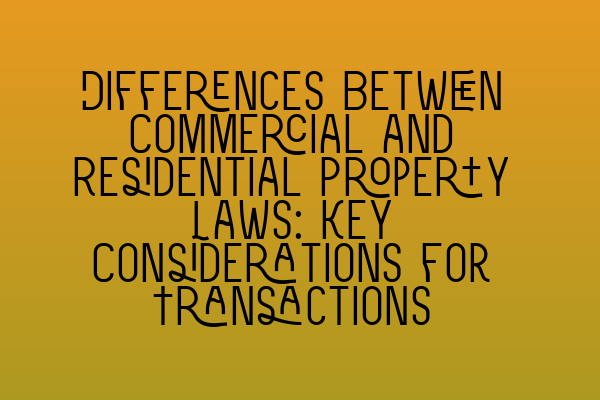Differences Between Commercial and Residential Property Laws: Key Considerations for Transactions
Property transactions are a complex and critical aspect of legal practice, requiring deep knowledge and expertise. Whether you are dealing with commercial or residential properties, understanding the differences in property laws is crucial for successful transactions. In this article, we will explore the key considerations between commercial and residential property laws to help you navigate these legal intricacies with ease.
1. Nature of the Property
The first and most fundamental difference between commercial and residential properties lies in their nature. Commercial properties are primarily used for business purposes, such as offices, retail stores, or industrial spaces. Residential properties, on the other hand, are intended for habitation by individuals or families.
Understanding the nature of the property is important in determining the applicable laws and regulations. Commercial properties are subject to specialized regulations encompassing zoning restrictions, health and safety regulations, and compliance with commercial leasing practices. In contrast, residential properties are subject to different regulations, such as tenancy laws, rent control measures, and property maintenance requirements.
If you are preparing for the SQE exam and want to test your knowledge on property law, take a look at these SQE 1 practice exam questions.
2. Legal Framework
The legal framework surrounding commercial and residential property transactions also differ significantly. Commercial property laws often involve complex contractual agreements, negotiation of leases, and the consideration of specific business-related clauses. Legal professionals dealing with commercial properties must have expertise in drafting and interpreting commercial leases, licenses, and contracts.
In contrast, residential property laws primarily focus on protecting tenants’ rights, maintaining suitable living conditions, and ensuring fair and lawful evictions. Residential property transactions typically involve residential leases, tenancy agreements, and statutory provisions aimed at safeguarding both tenants and landlords.
3. Financing and Tax Considerations
Financing and tax considerations play a significant role in both commercial and residential property transactions. However, the specific factors and implications differ between the two.
Commercial property transactions often involve complex financing structures, such as commercial mortgages, loans, and investments. Legal professionals dealing with commercial properties must navigate intricate financial arrangements and be adept at drafting and negotiating financing agreements that best suit their clients’ business interests.
Residential property transactions, on the other hand, typically involve simpler financing structures, such as residential mortgages. Understanding the legal requirements and implications of residential financing, including mortgage documents, interest rates, and repayment options, is crucial for lawyers involved in residential property transactions.
4. Dispute Resolution
Disputes between parties involved in property transactions can arise at any stage, and the methods of resolution may vary depending on the nature of the property.
In commercial property transactions, dispute resolution often involves complex negotiations, mediation, or even litigation. Legal professionals specializing in commercial properties must have strong negotiation and advocacy skills to effectively represent their clients’ interests and resolve complex disputes.
Residential property disputes are typically resolved through alternative methods, such as arbitration or mediation, to avoid costly and time-consuming court proceedings. Lawyers dealing with residential properties must be proficient in these alternative dispute resolution methods and possess a deep understanding of applicable residential tenancy laws and regulations.
If you are preparing for the SQE exam and looking for practice mocks in FLK1 and FLK2, click here to access our SQE 1 practice mocks.
Conclusion
While both commercial and residential property transactions involve legal complexities, understanding the key differences in property laws is essential for legal professionals practicing in this area. From the nature of the property to the legal framework, financing considerations, and dispute resolution, each aspect requires specialized knowledge and expertise.
As you embark on your legal career, it is crucial to stay updated with the latest developments in property law and ensure you have the necessary skills to handle both commercial and residential property transactions successfully.
Are you looking to prepare for the SQE exams? Check out our SQE 1 and SQE 2 preparation courses to enhance your knowledge and improve your chances of success. And don’t forget to keep an eye on the upcoming SRA SQE exam dates.
